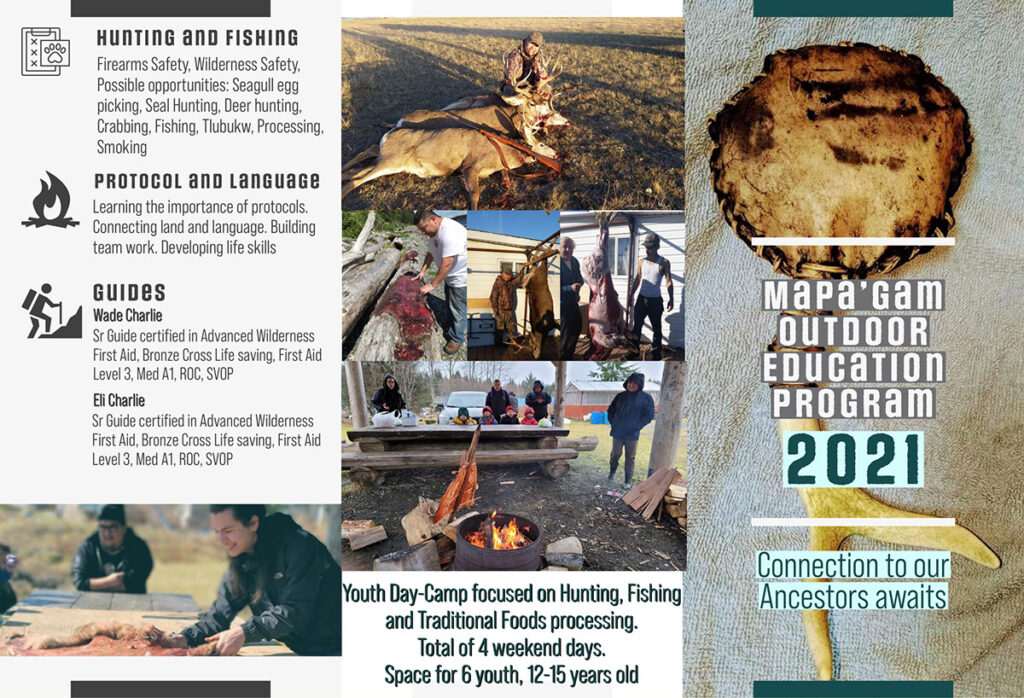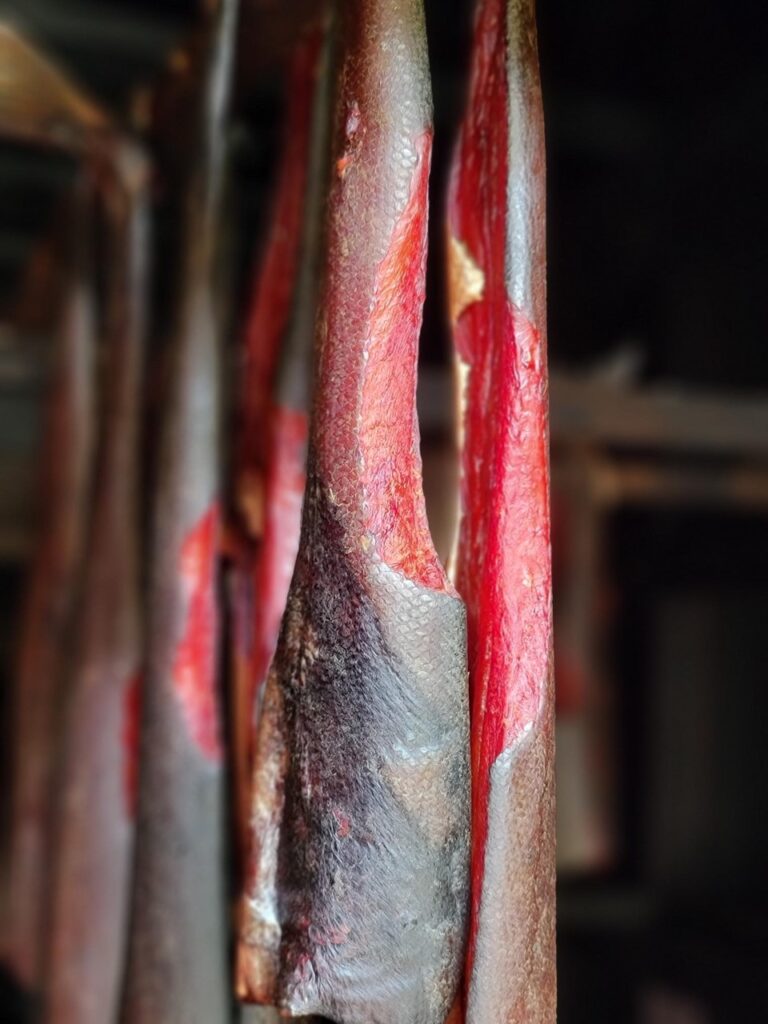Dave Flawse
On the northern tip of Vancouver Island, a low-lying fog obscures the treetops. The Island’s knotty, mountainous spine, and the brooding faces of the Coast Mountains across Queen Charlotte Strait sit fat with snow to sea level. It’s mid-January 2022, and the exceptionally chilly winter has lingered for almost a month.
Some reprieve comes when a sodden low-pressure system blows up from Hawaii and melts just enough snow to allow Wade Charlie to get to work; he speaks with me while he scours the forest for a red cedar snag.
I hear his footsteps on the other end of the line crunch against a gravel road. “We are going to start to teach the Guskamuxw youth how to sing on the log,” he tells me in a tone mixed with excitement and pride. “A round drum or hand drum is from the over the mountains people. We use a dugout log. We have to cut it to length then hollow it out.”
After the forced relocation by the Federal Government, the ‘Nakwaxd’xw lost some knowledge of not only drum making but traditional practices, and, as the owner of the outdoor education program, Ma’pa’gam, Charlie teaches youth and adults traditional hunting, harvesting, and processing techniques intertwined with ‘Nak’wala language and protocols.
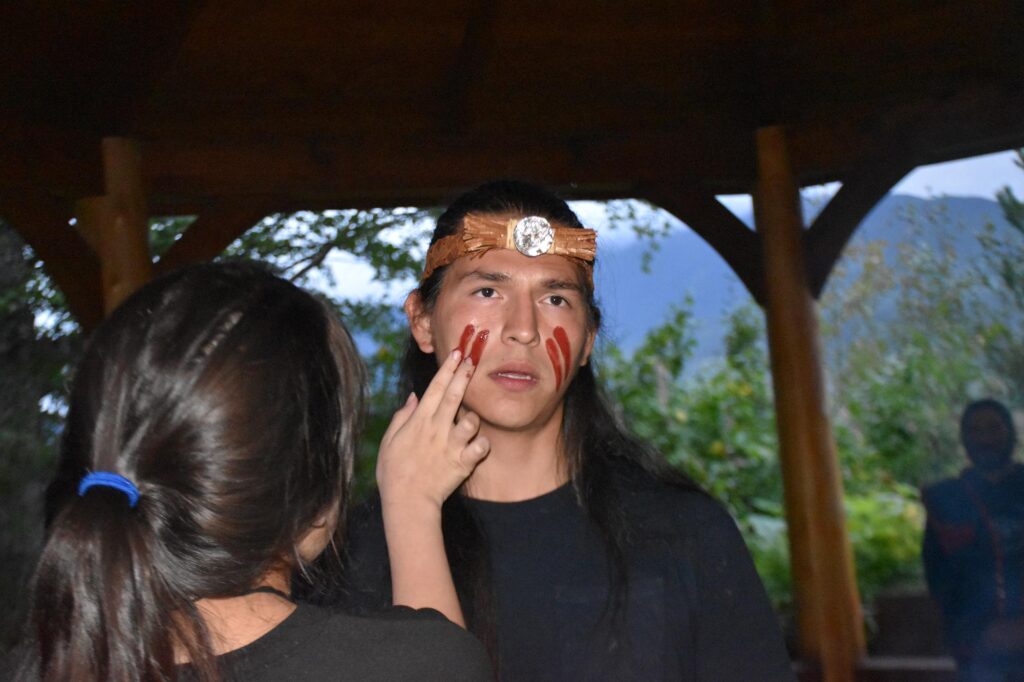
‘Nak’wala is the language of the ‘Nakwaxd’xw People, and Charlie’s grandpa was a hereditary chief. Charlie says he’s “the oldest of the oldest” in his family, and “that’s how the chieftainship is passed down.”
The ‘Nakwaxd’xw (10 clan tribe) are part of the Kwakwaka’wakw Nation which consists of 18 tribes whose territory encompasses the northern tip of Vancouver Island, Johnstone Strait south to Campbell River, Queen Charlotte Strait north to Smith Inlet and east up the many inlets of the mainland.
When he’s not busy teaching the next generation, barbequing and smoking salmon and clams—or searching for logs—Charlie is rebuilding a remote cedar cabin built by his grandpa, “who was very land-based and very cultural,” says Charlie.
In the summers of his childhood, when Charlie had finished school for the year, his grandpa would drop him and his brothers off with his uncle at the cabin, “and we’d live off the land there until September.”
They carved traditional halibut hooks and sunk them to the murky depths, dug a meter into the sand to pluck out geoducks as large as dinner plates, and tended a small garden—whatever would satisfy their rumbling bellies. When they weren’t harvesting food, they dug a well and did their laundry by peddling a bike connected to the washing machine to agitate the water.
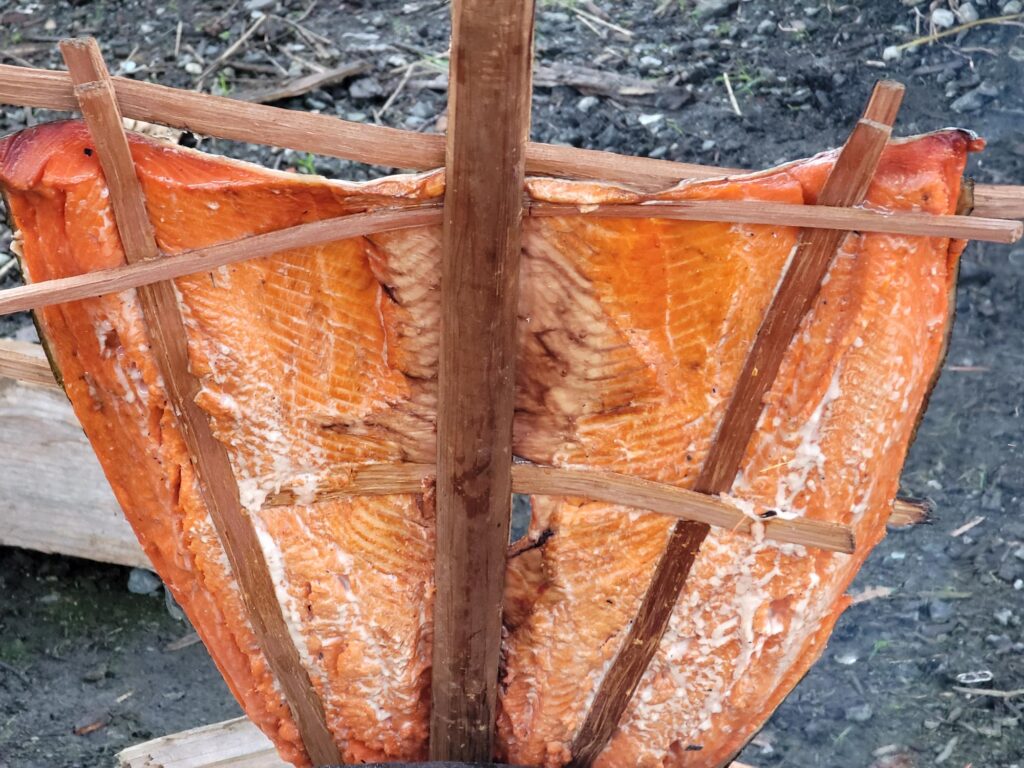
However, not every member of his tribe had a grandpa who still practiced traditional harvesting. Most stopped living that way after the Canadian Government forced the Gwa’sala and ‘Nakwaxda’xw peoples to relocate to their current site in 1964. “It was a forced relocation from Ba’as and Giga’ak which are our traditional villages,” says Charlie, “to Tsulquate which is Kwagu’ł traditional homelands.”
In the middle of the twentieth century, the Canadian Government sought to assimilate Indigenous peoples and eliminate any special status. The government pressured geographically isolated nations to amalgamate into larger units and relocate to semi-urban locations.
They promised the Gwa’sala and ‘Nakwaxda’xw Peoples improved living conditions if they moved from the mainland to a site near Port Hardy on the Island. When over 200 people left their traditional lands at the end of the fishing season in 1964, they arrived at Tsulquate where only three, partially constructed homes waited for them.
In their absence, the homes they had left back across Queen Charlotte Strait were looted and burned. With nowhere to go and winter looming, many lived on their boats on the Tsulquate River. Much like the winter of 2021/2022, the mercury plummeted, and over a meter of snow smothered the ramshackle settlement.
A quote from Gwa’sala-‘Nakwaxda’xw Stories published in 1997 reads, “liquor was easy to get. Then you could forget your troubles for a while. All of us have heard stories about that terrible time from our relatives who lived here then. Most of those people don’t really want to talk about it because it was so bad.”
Alan Fry, who spent fifteen years working for the Canadian Government as an Indian Agent in rural B.C., captured their dire situation and based his fictional book, How to Let a People Die, off of what he witnessed when he travelled to the area.
After the forced relocation, the Gwa’sala and ‘Nakwaxda’xw stopped harvesting foods like sea urchin. “That’s one thing I don’t know too much about,” says Charlie. “I do not harvest it, nor does anyone in our village from what I understand. It’s a lost tradition, unfortunately.”
The ‘Nakwaxda’xw traditionally gathered seagull eggs as well, and no members had harvested them in over a half a century until Charlie decided to give it a try.
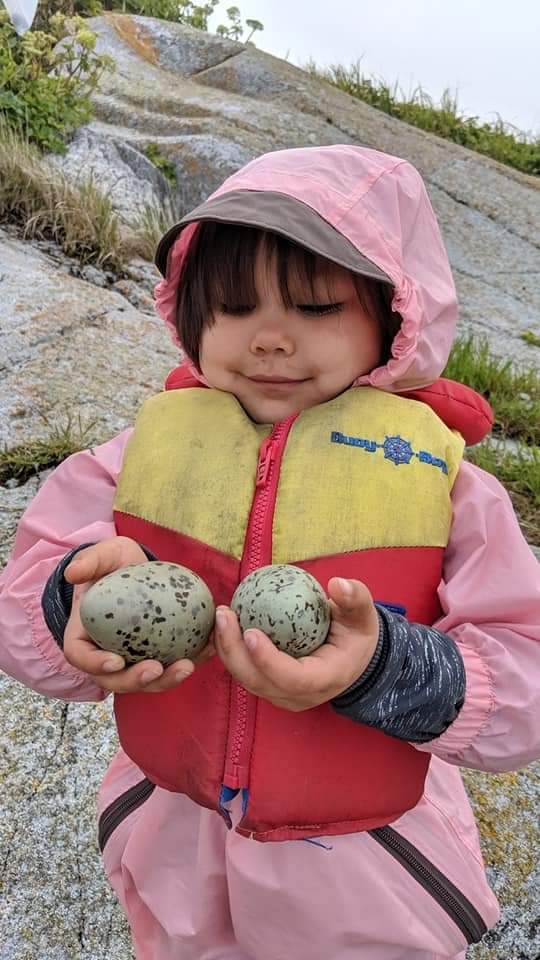
It was early June, and he motored out into the leaden-blue swells of Queen Charlotte Strait. “They build these nests on rocks that are quite secluded,” he says. “They are way out there in the middle of the ocean, so you have to go at the right time and in the right conditions.”
His first task after arriving on one of these islands was to break the existing eggs, “that forces them to relay all the eggs. So, when you crack it on the pan, it won’t go squawking around.” Seagull eggs are larger than chicken eggs and have a deep, almost red yolk. He gathered only what he needed and distributed 300 eggs to the whole community. The elders told Charlie they hadn’t had them since 1961.
Back under the forest’s canopy, Charlie has found a red cedar snag, a dead tree that’s dry and ready to be made into a drum. Slushy snow slides off the high branches to splat amongst the moss and sword ferns, and he wastes no time and digs his chainsaw into the snag.
With 30 years experience of living off the land, Charlie strives to revitalize as many traditions as possible and teach them through Ma’pa’gam. For traditional practices unfamiliar to Charlie, he consults the elders. “My grandmother told me 21 different ways to process seaweed,” he says. “How they used it. How they buried it. How they dried it. How they mixed it, everything.”
His next task is to revitalize another almost forgotten tradition. “We call it ‘stink eggs’ in English,” he says. “I don’t know that process quite yet. I’m going to be talking to my grandma soon, and she’ll explain how my grandpa did it.” Charlie does know you take any kind of salmon roe and let it ferment for six months. “It’s a delicacy, believe it or not.”
The low-lying fog on the North Island lifts, and the familiar white mountains on the mainland across the Strait peek out to greet the Gwa’sala and ‘Nakwaxda’xw from their vantage point in Tsulquate. The fog begins to lift too from the area to the north around their traditional villages, Ba’as and Giga’ak, and, with the help of Charlie, the shroud around the traditional life taken from the Gwa’sala and ‘Nakwaxda’xw Peoples after their forced relocation from the area begins to diminish.
Now, with the snag in a place he can work on it, Charlie begins to strip the bark. The aromatic bark curls from the log, and like the warm rain that’s exposing the moss and ferns in the forest around him, he bares yet another tradition stuck for so long in deep freeze.
*This story also appeared in the February/March issue of Compass Magazine.
